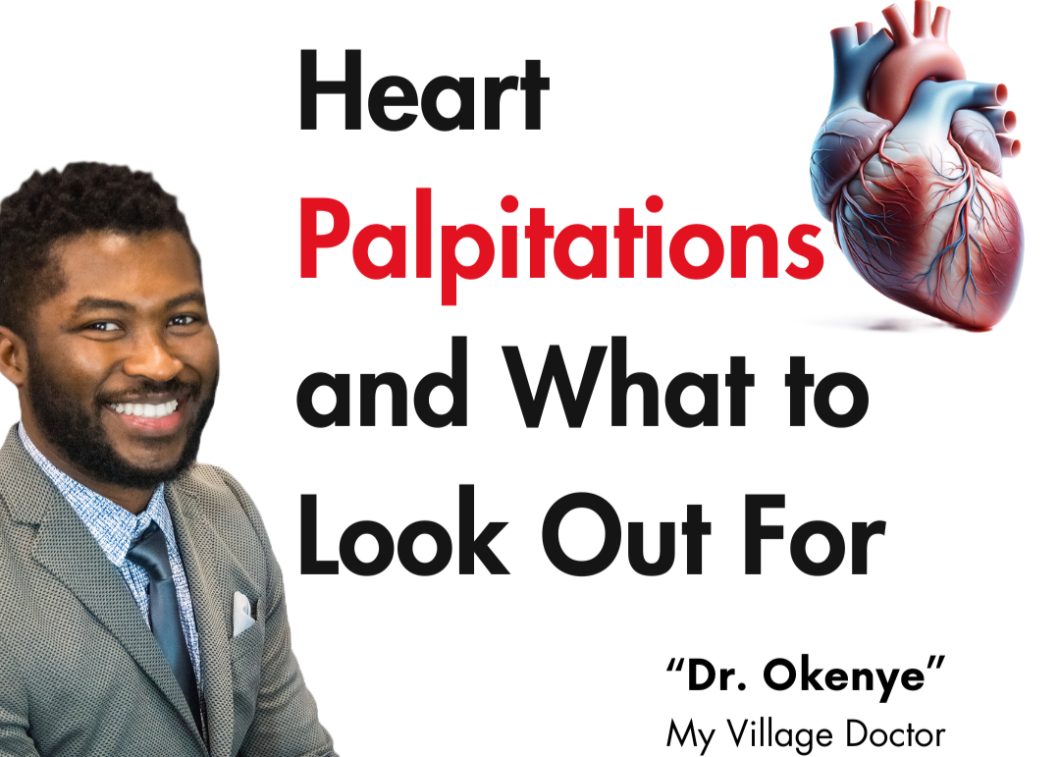Hello, my village people, it’s Dr. Okenye, your village doctor. I have received so many questions about palpitations. This week we are going to delve into this issue a bit more. To describe what palpitations are, consider that there is an orderly pathway for electrical signals to flow through the chambers of the heart that helps to generate what we term the “normal heartbeat”. Sometimes this signals misfire, and can cause irregular, skipped or extra beats which we term as Arrhythmia.
My people the truth is even healthy people can have arrhythmia once in a while and many people are not aware of minor irregularities. The problem though is that in some cases, these extra or skipped beats can cause other types of concerning heart rhythms that present with concerning symptoms or have devastating consequences.
There are six symptoms I want you to look out for if you are having palpitations that suggest more serious issues.
- Frequent palpitations
- Lightheadedness
- Fainting
- Unusual sweating or what we term as diaphoresis
- Chest pain
Most Common Causes of Heart Palpitations
Palpitations occur when the electrical activity and the mechanical activity of the heart are not in sync. We discussed symptoms that are more concerning and needs evaluation immediately if you are noticing them in addition to the palpitations. So, what causes palpitations? Today I want to discuss some of the most common causes of palpitations, so you know what to avoid
- Substance use, includes caffein, nicotine, alcohol and medications consider as stimulants which will include some decongestant medications many people commonly self-administer.
- Lifestyle factors that cause stress, anxiety, strenuous activities, and extreme fatigue. This is an important one
- Hormonal fluctuations. Especially in women when they are pregnant or going through menstruation or menopause
- Low blood pressure Having said this, you can look at this list and begin to know what you may need to modify to improve your palpitations. Having said this, palpitations can point to a more concerning issue that could have catastrophic consequences and this is exactly why you need to talk to your doctor about it. I’ll tell you more in the next video.
Potential Conditions That Palpitations Tend to Be a Symptom Of
In the first part we discussed what palpitations are in general terms and what symptoms accompany it. The second part described the common triggers for palpitations in their general categories. In this part, I want to discuss the potential conditions that palpitations tend to be a symptom of:
- Low volume state: The human body responds to decreased blood volume by increasing the heart rate rapidly. In my elderly patients especially, sudden onset of palpitations is a suggestion of decreased blood volume, and when associated with other constitutional symptoms, it could suggest severe sepsis. Quick volume resuscitation plus IV antibiotics will help improve their conditions and help resolve their palpitations.
- Cardiomyopathy: Damage to the heart muscle will cause decreased flow output, and palpitations could point you to this damage if you investigate further.
- Thyroid disease: Especially hyperthyroidism.
- Other catastrophic arrhythmias: Yes, a simple heart monitor for a little while could expose more concerning heart blocks, atrial flutters, atrial fibrillations, etc.
For all these reasons, do not take palpitations lightly. I’ll talk to you later.
Disclaimer: The information provided is for educational purposes only and is not a substitute for professional medical advice. Always consult your doctor before starting any new medication or treatment. This publication and aurthors does not endorse or recommend any specific medication and is not liable for any adverse effects from the use of this information. You can learn more about Dr. Okenye.


